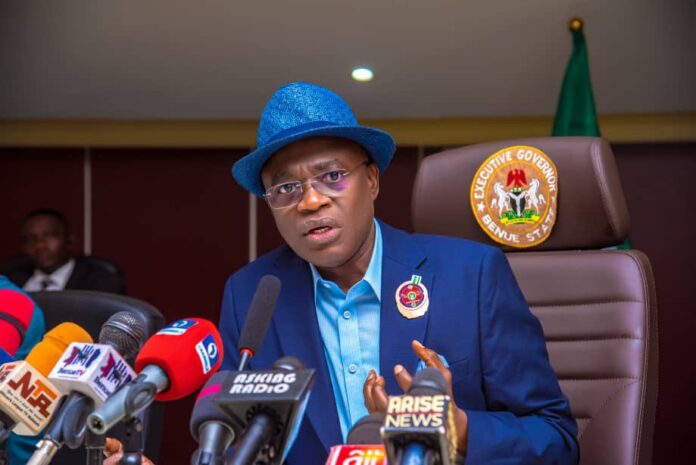By K.K Katsina
After the Aondona Dajoh-led Benue State House of Assembly voted against Mr. Yangien Ornguga’s commissioner nomination on the 20th of August, 2025—citing numerous petitions and public disapproval during a plenary in Makurdi—the masses responded with fervent endorsement. This was a pleasant surprise: here was a group of politicians actually listening to the people. In this very porous, very questionable Nigerian democracy, where such a thing is a rarity, political onlookers, even disinterested political onlookers, caught themselves hesitating to dream: is the world finally healing? But the rug would be pulled right under their feet in the ten days that ensued, leaving them dazed, bewildered, and utterly disappointed in not only a continuously flawed system, but a protagonist who is finding it more and more difficult to keep from lapsing into hubris.
BACKGROUND
It was a packed session on the 20th of August, 2025, at the Benue State government house: the temporary chamber of the Benue State House of Assembly. Top on the agenda? The approval or non-approval of commissioner nominees sent to the house by the governor. The governor, Reverend Father Hyacinth Alia, had, about two weeks earlier, dissolved his entire cabinet, including his chief of staff. A new cabinet was being formed.
The air in the temporary chamber was thick, not just with humidity, but with the weight of impending decision. On that gleaming afternoon, every polished bench and every focused gaze was trained on the front, where the fate of Governor Hyacinth Alia’s reconstituted cabinet lay in the hands of the House of Assembly.
The routine approvals had proceeded without incident—names called, affirmations given, gavel dropped. A familiar rhythm. Then came the name: Mr. Yangien Ornguga. Doctor of Laws and associate professor at the Father Moses Orshio Adasu University (formerly Benue State University.)
And the rhythm broke.
The distinguished academic walked up to the platform and gave a brief self-introduction, after which the assembly member representing his constituency proposed the confirmation of his nomination. The house clerk’s voice, usually a vessel of procedure, took on a new, heavier tone. He held aloft not a curriculum vitae, but a sheaf of papers. “Honourable members,” he intoned, the rustle of papers echoing in the sudden quiet, “we are in receipt of numerous petitions against the nominee from Kwande”
The phrase hung in the air, numerous petitions. It was an administrative term that carried the thunder of public dissent. In a system where such documents are usually buried, their mere acknowledgement from the high chair was a seismic event.
One by one, lawmakers rose to probe. They spoke of “grave allegations” and “specific charges of victimisation” that struck at the core of public trust. Their language was careful, legally precise, avoiding slander but brimming with implication. A whole class of alumni—set 2015—of the then Benue State University Law faculty had petitioned. Across social media, users alluded to abundant allegations of Mr. Ornguga’s maltreatment of students. One member recounted the night before the plenary, when a random person approached him and alleged that Mr. Ornguga had psychologically abused him during his undergraduate program at the then Benue State University, claiming the lecturer had forced him to declare in front of the whole class that he was a fool. The nominee, Mr. Ornguga, stood silently, the focus of a gathering storm he evidently had not forecast.
It was a spectacle of accountability, a live autopsy of a candidacy. The House, often a chorus for the executive, had found a dissonant voice. When the motion to withhold confirmation was put to a voice vote, the “Ayes” did agree, vehemently, ringing out with a conviction that seemed to startle even those who uttered them. And at that moment the state house of Assembly became, for Doctor Ornguga, a chamber of consequence.
But the term goes both ways, consequence. For this decision—simply letting democracy take its course—would be the undoing of the House’s leadership in a matter of days. Some things don’t need to be said: in politics, events add up.
A PATTERN OF ASSAULT
To view the retaliation against Speaker Dajoh as an isolated incident is to miss the forest for a single, felled tree. It was, in fact, the latest act in a protracted assault on democratic institutions by the Alia administration.
First came the high-handed dissolution of the elected local government councils. Shortly after taking office, Governor Alia suspended the entire leadership of the 23 Local Government Areas, elected by the people, and replaced them with handpicked caretaker committees. This was a blatant act of executive overreach that nullified the people’s mandate at the grassroots and centralized power in the Government House.
Then, there was the attempted bypassing of the legislature in the 2024 budget process. Reports emerged that the executive branch sought to implement the budget without the constitutionally mandated appropriation by the House of Assembly, treating the legislature as a mere rubber stamp rather than a co-equal arm of government.
Most alarmingly, the governor trained his sights on the judiciary, initiating at the beginning of this year an unconstitutional attempt to remove the State Chief Judge, Justice Maurice Ikpambese. The move, which required the state assembly to violate the clear constitutional procedure that reserves such power for the National Judicial Council (NJC), was a brazen effort to intimidate the judiciary and bend it to the executive’s will. It was an attack on the very foundation of judicial independence.
Against this backdrop of institutional demolition, the House of Assembly’s vote on the 20th of August was not just a decision; it was a defiance. It was the one pillar that refused to crumble. For once, the legislature stood firm in its role as the people’s representative, performing its duty without fear or favour.
But for an executive that had grown accustomed to absolute compliance, this act of independence was an intolerable rebellion.
Because just three days later, the Speaker, Honourable Aondona Dajoh, would survive an impeachment attempt bearing all the markings of the governor’s sleight of hand. And two days after that, the same Aondona Dajoh would shockingly pen (handwritten, mind you) a letter of resignation as Speaker of the Benue State House of Assembly, citing “peace” and, brazenly, the “good of the state.”
An emergency plenary was hurriedly called the next day—and of all days, a Sunday!—to enthrone the very man who had initiated the motion to impeach the speaker just three days prior: a suspended member, whose suspension was, on that day, promptly unsuspended.
It does not stop there. A plenary would be called the next day, in which the brand new Speaker would force through the confirmation of yours truly, Mr. Yangien Ornguga, as commissioner!
The chain of causation is clear: the speaker listens to the people and his members. He does not confirm the controversial Mr. Yangien Ornguga. So, the speaker is ousted. A new speaker takes his place. The rejected nominee is confirmed. One is forced to do a double-take about the governor. Who does the governor stand for?
FOR THE “MASSES” OR FOR THE MASSES?
It is naive, even obtuse, to suggest that a state speaker from the governor’s own party could be forced to resign without the governor’s approval. Such a move would require at least the governor’s tacit connivance in any state in Nigeria.
Governor Hyacinth Alia, a man who trades on his spiritual credentials as a Catholic priest, has demonstrated that his true faith lies not in the sacred tenets of democracy—which demand respect for the separation of powers—but in the profane exercise of raw, unaccountable power. The legislature, designed to be a pillar of deliberation and the voice of the people, was treated as a mere nuisance to be bulldozed the moment it dared to exercise its constitutional duty.
This begs the question: is Father Alia truly concerned about the “masses” as he so often claims, or is all he is doing just attending Masses and making a show of being a spiritual man? His actions suggest a chilling hypocrisy. He wears the collar of a servant but wields power like an autocrat. He speaks of the people’s will but works feverishly to subvert it when it contradicts his own.
The governor, who should be a moral compass for the state, has instead chosen to be its chief manipulator. In ten days, he reduced the Benue State House of Assembly to a farcical theatre where suspensions are lifted on a whim, emergency Sunday plenaries are convened to execute personal vendettas, and the clear will of the people—voiced through their representatives and numerous petitions—is contemptuously overturned. The message is clear: in Father Alia’s Benue, democracy is only valid when it yields the result he desires.
This episode is more than a political misstep; it is a profound character revelation. It exposes a gaping chasm between the governor’s pious rhetoric and his ruthless practice. He may well continue to attend masses, but his blatant disrespect for every arm of government—local, legislative, and judicial—proves that for all his spiritual posturing, his governance is deeply, and tragically, ungodly.






